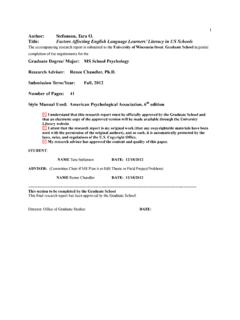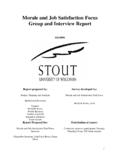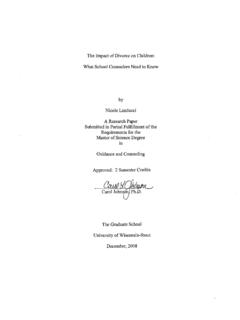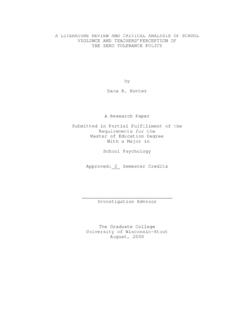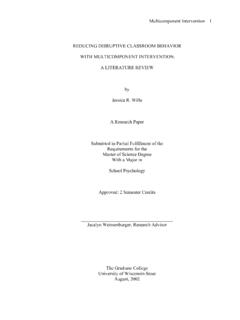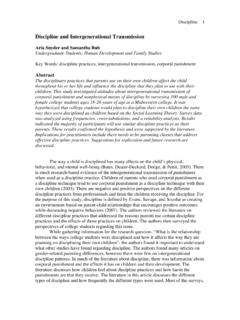Transcription of THE EFFECTS OF EMPLOYEE DEVELOPMENT PROGRAMS ON
1 THE EFFECTS OF EMPLOYEE DEVELOPMENT PROGRAMS ON JOB SATISFACTION AND EMPLOYEE RETENTION By Karen Shelton A Research Paper Submitted for Partial Fulfillment of the Requirements for the Master of Science Degree in training and DEVELOPMENT Approved for Completion of 4 Semester Credits TRHRD-735-001 _____ Research Advisor The Graduate College University of Wisconsin-Stout May 2001 i The Graduate College University of Wisconsin-Stout Menomonie, WI 54751 ABSTRACT Shelton Karen L. (Write) (Last Name) (First Name) (Initial) The EFFECTS of EMPLOYEE DEVELOPMENT PROGRAMS on Job Satisfaction and EMPLOYEE Retention (Title) training and DEVELOPMENT Dr. Joseph Benkowski May 2001 51 (Graduate Major) (Research Advisor) (Month/Year) (No.)
2 Of pages) Publication Manual of the American Psychological Association (Name of Style Manual Used in this Study) This research analyzes the significance of EMPLOYEE DEVELOPMENT PROGRAMS on EMPLOYEE retention and job satisfaction. It also takes business success into consideration. The method for this project consisted of an analysis of two studies, one conducted by the Gallup Organization and the other conducted by the American Society for training and DEVELOPMENT and the Society for Human Resource Management. The study determined that training and DEVELOPMENT increase EMPLOYEE satisfaction and are significant in an EMPLOYEE s decision to stay with a company. It also indicated that the impact of training decreases without the organizational culture to support employees in the DEVELOPMENT process. ii ACKNOWLEDGEMENTS I would first like to thank my wonderful fianc , Doug. I could not have gotten through this project or this degree program without his love, support, understanding, and help creating graphs.
3 I would also like to thank my good friend Kelli. Without her encouragement, I do not think I would have maintained the motivation to finish. I would also like to thank my family. They are amazing role models for me and I would not have ever pursued this degree without them. Finally, I would like to thank Dr. Joseph Benkowski, my Research Advisor, Academic Advisor, and the training and DEVELOPMENT Program Director. Joe not only guided me through this project and challenged me to make it the best it could be; he also helped me through the training and DEVELOPMENT program. I cannot thank him enough for his help and encouragement. iii TABLE OF CONTENTS I. Research Problem and 1 A. 1 B. Problem 1 C. 2 D. Research 3 II. Review of A. 4 B. EMPLOYEE DEVELOPMENT 6 1. 6 2. 9 3. Key 11C. Individual 171. Career 172. EMPLOYEE Organizational 211. EMPLOYEE 212. Market 223. Managerial 23 III. Research 25A. Research 25B.
4 27C. Data 28D. Comparison 29IV. A. Amount of training 32B. training 34C. EMPLOYEE Empowerment in 36D. Organizational 38E. Recruitment and 39F. Job 40V. Conclusions and 43A. History of EMPLOYEE DEVELOPMENT 43B. Role of EMPLOYEE DEVELOPMENT in Retention and 44C. Benefits of EMPLOYEE Employers Role in EMPLOYEE Employees Role in EMPLOYEE 46F. 491 Chapter 1 Research Problem and Objectives Introduction In any industry the success of an organization is extremely dependent on its human resources. Although there are many other factors that play a key role, a company must have effective employees in order to stay financially solvent and competitive. In order to maintain this valuable commodity, organizations must be aware of EMPLOYEE satisfaction and retention. Many companies make the mistake of assuming that employees are only seeking financial benefits for their jobs. This assumption overlooks the high importance many people place on the intrinsic benefits of their careers.
5 It is not only a mistake for EMPLOYEE satisfaction and retention, but it also has negative business consequences. Organizations must have employees who are able to quickly adapt to an ever-changing world market. Companies need to invest in on-going EMPLOYEE DEVELOPMENT in order to both keep employees and be successful. Problem Statement The problem of this study is to analyze the significance of EMPLOYEE DEVELOPMENT PROGRAMS on EMPLOYEE retention and job satisfaction with regard to business success. Purpose The purpose of this study is to review current literature and analyze previous studies to evaluate whether or not EMPLOYEE DEVELOPMENT PROGRAMS are beneficial to an organization. Although it is not specific to a particular company or industry, it is intended to give a general overview of the concept. Research and practical evidence of career 2 DEVELOPMENT PROGRAMS already exists. This study will take pieces of these two areas and draw conclusions about how to use the information.
6 Definitions Business Success: A company s ability to remain solvent and grow within its market. Career competencies : The knowledge, skills, and abilities needed for a person to attain his/her desired career. Career Planning: An organizational initiative to help employees assess their skills, define their career goals, and create an action plan for accomplishing those goals. The organization is also responsible for holding employees accountable to those goals. Corporate University: A training environment used by some companies intended to make training and DEVELOPMENT opportunities constantly available to employees at a sight designed for such activities. EMPLOYEE DEVELOPMENT : A system for assisting employees to develop within their current jobs or advance to fulfill their goals for the future. EMPLOYEE Retention: A company s ability to keep quality employees who are contributing to business success. EMPLOYEE Satisfaction: The level to which employees enjoy their jobs and are willing to put forth effort toward the success of an organization.
7 Goal Setting: The process of establishing one s plans for future jobs and careers. Market Competition: The organizations that are in the same business as a company that compete for the same customer or client base. 3 Organizational Culture: The overall environment in which an EMPLOYEE works within a particular company. Research Objectives This research project will meet the following objectives: 1. Review the history of EMPLOYEE DEVELOPMENT PROGRAMS . 2. Analyze the role of EMPLOYEE DEVELOPMENT in retention and satisfaction. 3. Analyze the benefits of EMPLOYEE DEVELOPMENT . 4. Review the employer s role in EMPLOYEE DEVELOPMENT . 5. Clarify the EMPLOYEE s role in EMPLOYEE DEVELOPMENT . 4 Chapter 2 Review of Literature History EMPLOYEE DEVELOPMENT PROGRAMS are not a new idea in the United States. General Motors established one of the first corporate universities in 1927 with the General Motors Institute (Gerbman, 2000). The concept was slow to catch on, but in the 1950s a variety of organizations followed the same path.
8 During the 1950s General Electric established Crotonville Management DEVELOPMENT Institute and Walt Disney began Disney University (Gerbman, 2000). McDonald s followed this trend with the establishment of Hamburger University to train its managers in the early 1960s (Garger, 1999). Despite these progressive organizations, EMPLOYEE DEVELOPMENT and career planning still experienced some growing pains. In the 1970s, career planning and DEVELOPMENT efforts were focused on young employees that seemed to have high potential. It was a way for companies to plan for the future and nurture young workers for senior management positions (Moses, 1999). This career path model fit well with the traditional commitment employees would offer to companies. Chris Argyris referred to this commitment as a psychological contract in which employers were almost guaranteed long term loyalty and commitment to the organization in return for giving employees job security, opportunities for promotion, and training (Feldman, 2000).
9 The ability to get on this fast track to the top of a company diminished in the 1980s when companies were moving to a flattened hierarchy with less room for promotions. People quickly realized that they were reaching plateaus in their careers and the opportunities for advancement did not exist (Moses, 1999). The concept 5 of career planning became less realistic for both individuals and organizations because neither could count on long term commitment (Feldman, 2000). The stock market crash of 1987 was a major turning point in EMPLOYEE DEVELOPMENT . Daniel Feldman keenly states that, where once large corporations were seen as bastions of job security, they are now seen as minefields of job insecurity (2000). Not only were corporations flattening, they were also downsizing and restructuring to compensate for loss of revenue. These drastic changes in the job market also led to changes in EMPLOYEE DEVELOPMENT PROGRAMS . Barbara Moses states that, today, job security is dead and loyalty to the organization in the tradition sense has died along with it (1999).
10 Under this assumption, companies have to change the way they view EMPLOYEE DEVELOPMENT . Where once training and DEVELOPMENT were viewed as mechanisms for employees to move up the corporate ladder, promotion is no longer an incentive for employees because it is not a definite option. Companies began realizing that they can challenge employees with lateral moves, skills DEVELOPMENT , job enrichment and special assignments (Moses, 1999). Although organizations could not offer the same commitment of the past with the market change in the 1980s, they could use EMPLOYEE DEVELOPMENT to support and retain employees who were not lost in the downsizing and restructuring (Moses, 1999). EMPLOYEE DEVELOPMENT took a necessary shift from focusing on promotion to focusing on skill DEVELOPMENT (Feldman, 2000). As the stock market gained strength again through the 1990s, retention again became an issue for organizations. However, the shift in mentality meant that employees may not make a commitment for their entire careers, but they may stick around for a few years in a company that showed a concern for them 6 (Moses, 1999).


